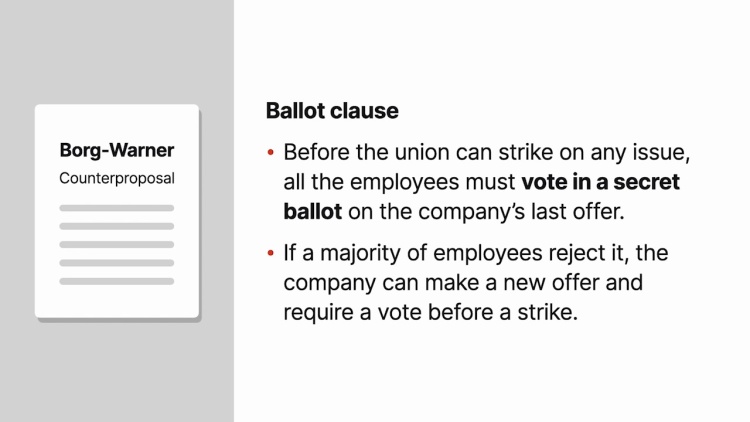National Labor Relations Board v. Wooster Division of Borg-Warner Corp.
United States Supreme Court
356 U.S. 342 (1958)
- Written by Rose VanHofwegen, JD
Facts
The National Labor Relations Board (NLRB) (plaintiff) certified an international union as bargaining representative for some of the employees of the Wooster Division of Borg-Warner Corp. (defendant). Shortly afterward, the international union chartered a local affiliate. Together the unions submitted a proposed collective-bargaining agreement to the company that identified both unions as bargaining agent. The company countered with a proposal that recognized only the local union, specifically excluding the international. The company also insisted on a ballot clause requiring employees to secretly vote on the company’s last offer before the union could strike in the event of a dispute. The unions initially rejected both clauses as unacceptable and called a strike, but the company demanded both clauses as a condition of any agreement. After a strike, the local union eventually gave in and signed a contract containing both controversial clauses. Meanwhile, the international union filed charges with the NLRB, claiming that the company’s insistence on the two clauses amounted to a failure to bargain in violation of the National Labor Relations Act (NLRA). The NLRB ordered the company to cease insisting on either clause, but the appellate court affirmed only as to the recognition clause, finding the ballot clause acceptable. The Supreme Court granted review.
Rule of Law
Issue
Holding and Reasoning (Burton, J.)
Concurrence/Dissent (Frankfurter, J.)
Concurrence/Dissent (Harlan, J.)
What to do next…
Here's why 907,000 law students have relied on our case briefs:
- Written by law professors and practitioners, not other law students. 47,100 briefs, keyed to 996 casebooks. Top-notch customer support.
- The right amount of information, includes the facts, issues, rule of law, holding and reasoning, and any concurrences and dissents.
- Access in your classes, works on your mobile and tablet. Massive library of related video lessons and high quality multiple-choice questions.
- Easy to use, uniform format for every case brief. Written in plain English, not in legalese. Our briefs summarize and simplify; they don’t just repeat the court’s language.





